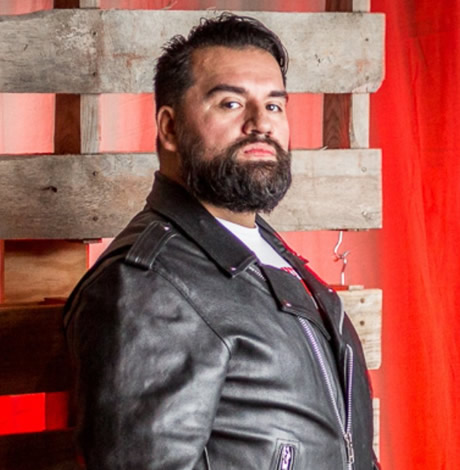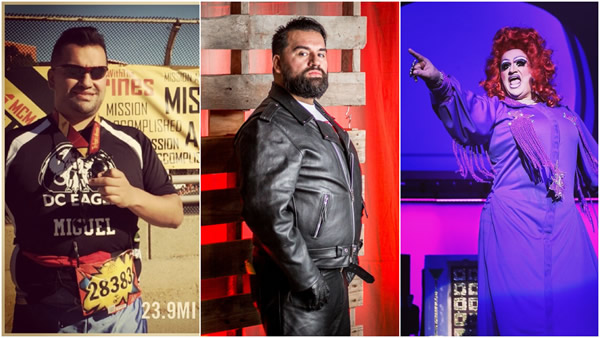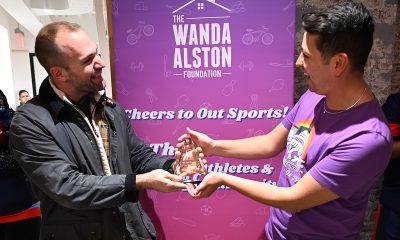Sports
Leather, drag enthusiast finds community in D.C.
Miguel Ayala finds connections if ‘you dig deeper’


Miguel Ayala in his various guises. (Photo left courtesy Ayala; middle photo by Denis Largeron; photo three courtesy Manor Photography)
Trying to figure out where you belong in the LGBT community can be an intimidating process. The transient nature of Washington means there is a revolving door of new people moving to the District on a regular basis.
It’s possible that newcomers were tied to an LGBT community in their prior location, but moving to a new city is an opportunity to explore new options. It might be a chance to find their inner athlete, try a harness on for the first time or imagine the thought of getting up on stage in drag.
Providence, proximity or common purpose can lead anyone to something new, but it could also be as simple as just leaving fears behind and taking that step forward.
Miguel Ayala has found a place in multiple LGBT communities and there were varied reasons for him joining each of them.
“A lot of people think there is no crossover in the LGBT communities, but if you dig deeper you are going to find the connections,” Ayala says. “People are exploring what makes them tick and to accomplish that, they are looking in several places.”
Ayala grew up in Chicago and that first step forward happened for him when he was browsing curriculum as a high school freshman and he noticed that there was English and African-American literature, but nothing for the Latino community.
“That really got my wheels turning,” Ayala says. “I thought there should be parity and I got involved in trying to change the curriculum.”
He served on student council and the city-wide Chicago school board along with starting the LGBT Student Pride Club. His political path continued at DePaul University where he served as a resident assistant and his fraternity chapter president along with being a member of the Pride Club and multicultural Greek council.
During his undergrad years he spent a summer as an intern with congressman Luis Gutierrez and after graduation, he moved to the District in 2002. For 14 years he worked as a federal employee, mostly on Capitol Hill.
After volunteering with the Obama campaign, he left his job in 2016 to join the Clinton campaign as communications director for the State of Nevada. He is now self-employed as an independent contractor.
“When I first came to D.C., I thought I would do my graduate work at one of the universities here,” Ayala says. “I ended up with the political bug and was lured in by the Capitol dome.”
Finding his LGBT community in the District evolved into finding multiple communities. The only sports he played growing up were neighborhood games of basketball and football. Hoping to embrace a more fit and healthy lifestyle, he started going to pick-up basketball games with the D.C. Sentinels and eventually joined their league along with Stonewall Kickball and the D.C. Front Runners.
He ended up running several half marathons including the race at the Cleveland Gay Games. His first full marathon was completed at the Marine Corps Marathon. Since 2013, he has been a board member of Team D.C., the information clearinghouse for LGBT sports.
“Joining the sports community was an opportunity to build friendships not tied to going to bars,” Ayala says. “It was eye-opening that there was this whole LGBT community dedicated to sports in D.C. and even beyond through tournaments. I am building connections all around the country.”
Another community was a curiosity, but the stereotype of masculinity meant dealing with a structure where he might not be accepted. He popped into the International Mister Leather conference in Chicago and ran out the door.
When the D.C. Eagle was on New York Avenue, he moved nearby and wanted to check out his neighborhood bar. He met Kyle Collins and it was a launchpad to finding other ways to get involved with the leather community. He ran for the Mr. D.C. Eagle title and became one of the co-founders of D.C. Leather Pride.
“The leather community has allowed me to embrace my sexuality and to appreciate that there are different people who like different things,” Ayala says. “I didn’t understand that until I was part of the community. I have found another family that reaches across the country.”
Dressing as a woman for Halloween in high school might not count as drag, but Ayala recognized that there is a thriving drag community. When he found out that the Miss Adams Morgan Pageant was supporting nonprofits, he put his energy into having some fun. Enter Moka Loka Latte.
As a member of the Dupont Social Club, he has competed three times at Miss Adams Morgan. Next month he will be performing at Valentine’s Day is a Drag to benefit SMYAL.
“Performing in drag without making a living out of it, allows me to do something for our community through fundraising,” Ayala says. “It is fun and it has an impact.”
The commonality in all of Ayala’s endeavors is “found family” and community. It reaches far beyond the D.C. metro area.
“I choose to be a part of all of these communities because I like to see their impact on our entire community,” Ayala says. “Their effect goes well beyond D.C. and creates national communities.”
Sports
US wins Olympic gold medal in women’s hockey
Team captain Hilary Knight proposed to girlfriend on Wednesday

The U.S. women’s hockey team on Thursday won a gold medal at the Milan Cortina Winter Olympics.
Team USA defeated Canada 2-1 in overtime. The game took place a day after Team USA captain Hilary Knight proposed to her girlfriend, Brittany Bowe, an Olympic speed skater.
Cayla Barnes and Alex Carpenter — Knight’s teammates — are also LGBTQ. They are among the more than 40 openly LGBTQ athletes who are competing in the games.
The Olympics will end on Sunday.
Sports
Attitude! French ice dancers nail ‘Vogue’ routine
Cizeron and Fournier Beaudry strike a pose in memorable Olympics performance

Madonna’s presence is being felt at the Olympic Games in Italy.
Guillaume Cizeron and his rhythm ice dancing partner Laurence Fournier Beaudry of France performed a flawless skate to Madonna’s “Vogue” and “Rescue Me” on Monday.
The duo scored an impressive 90.18 for their effort, the best score of the night.
“We’ve been working hard the whole season to get over 90, so it was nice to see the score on the screen,” Fournier Beaudry told Olympics.com. “But first of all, just coming out off the ice, we were very happy about what we delivered and the pleasure we had out there. With the energy of the crowd, it was really amazing.”
Watch the routine on YouTube here.
Italy
Olympics Pride House ‘really important for the community’
Italy lags behind other European countries in terms of LGBTQ rights

The four Italian advocacy groups behind the Milan Cortina Winter Olympics’ Pride House hope to use the games to highlight the lack of LGBTQ rights in their country.
Arcigay, CIG Arcigay Milano, Milano Pride, and Pride Sport Milano organized the Pride House that is located in Milan’s MEET Digital Culture Center. The Washington Blade on Feb. 5 interviewed Pride House Project Manager Joseph Naklé.
Naklé in 2020 founded Peacox Basket Milano, Italy’s only LGBTQ basketball team. He also carried the Olympic torch through Milan shortly before he spoke with the Blade. (“Heated Rivalry” stars Hudson Williams and Connor Storrie last month participated in the torch relay in Feltre, a town in Italy’s Veneto region.)
Naklé said the promotion of LGBTQ rights in Italy is “actually our main objective.”
ILGA-Europe in its Rainbow Map 2025 notes same-sex couples lack full marriage rights in Italy, and the country’s hate crimes law does not include sexual orientation or gender identity. Italy does ban discrimination based on sexual orientation in employment, but the country’s nondiscrimination laws do not include gender identity.
ILGA-Europe has made the following recommendations “in order to improve the legal and policy situation of LGBTI people in Italy.”
• Marriage equality for same-sex couples
• Depathologization of trans identities
• Automatic co-parent recognition available for all couples
“We are not really known to be the most openly LGBT-friendly country,” Naklé told the Blade. “That’s why it (Pride House) was really important for the community.”
“We want to use the Olympic games — because there is a big media attention — and we want to use this media attention to raise the voice,” he added.

Naklé noted Pride House will host “talks and roundtables every night” during the games that will focus on a variety of topics that include transgender and nonbinary people in sports and AI. Another will focus on what Naklé described to the Blade as “the importance of political movements now to fight for our rights, especially in places such as Italy or the U.S. where we are going backwards, and not forwards.”
Seven LGBTQ Olympians — Italian swimmer Alex Di Giorgio, Canadian ice dancers Paul Poirier and Kaitlyn Weaver, Canadian figure skater Eric Radford, Spanish figure skater Javier Raya, Scottish ice dancer Lewis Gibson, and Irish field hockey and cricket player Nikki Symmons — are scheduled to participate in Pride House’s Out and Proud event on Feb. 14.
Pride House Los Angeles – West Hollywood representatives are expected to speak at Pride House on Feb. 21.
The event will include a screening of Mariano Furlani’s documentary about Pride House and LGBTQ inclusion in sports. The MiX International LGBTQ+ Film and Queer Culture Festival will screen later this year in Milan. Pride House Los Angeles – West Hollywood is also planning to show the film during the 2028 Summer Olympics.
Naklé also noted Pride House has launched an initiative that allows LGBTQ sports teams to partner with teams whose members are either migrants from African and Islamic countries or people with disabilities.
“The objective is to show that sports is the bridge between these communities,” he said.
Bisexual US skier wins gold
Naklé spoke with the Blade a day before the games opened. The Milan Cortina Winter Olympics will close on Feb. 22.
More than 40 openly LGBTQ athletes are competing in the games.
Breezy Johnson, an American alpine skier who identifies as bisexual, on Sunday won a gold medal in the women’s downhill. Amber Glenn, who identifies as bisexual and pansexual, on the same day helped the U.S. win a gold medal in team figure skating.
Glenn said she received threats on social media after she told reporters during a pre-Olympics press conference that LGBTQ Americans are having a “hard time” with the Trump-Vance administration in the White House. The Associated Press notes Glenn wore a Pride pin on her jacket during Sunday’s medal ceremony.
“I was disappointed because I’ve never had so many people wish me harm before, just for being me and speaking about being decent — human rights and decency,” said Glenn, according to the AP. “So that was really disappointing, and I do think it kind of lowered that excitement for this.”
-

 Massachusetts5 days ago
Massachusetts5 days agoEXCLUSIVE: Markey says transgender rights fight is ‘next frontier’
-

 Opinions4 days ago
Opinions4 days agoGay Treasury Secretary’s silence on LGBTQ issues shows he is scum
-

 New York4 days ago
New York4 days agoLawsuit to restore Stonewall Pride flag filed
-

 U.S. Military/Pentagon4 days ago
U.S. Military/Pentagon4 days ago4th Circuit rules against discharged service members with HIV




















